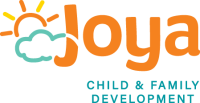Joya Child & Family Development is participating in a University of Washington study that is focused on improving early diagnosis of autism spectrum disorder (ASD) and increasing access to specialized services when needed.
“Because of the variability of features seen with social communication disorders, such as autism, it can be difficult to make diagnoses as early as we would like,” said Dr. Matt Thompson, local pediatrician and medical director of Joya. Dr. Thompson has received additional training to help him screen and diagnose children with autism and he has been designated as a Center of Excellence.
The UW Screen-Refer-Treat (SRT) study is funded by a grant from the National Institute of Mental Health. The study will collect data from parents of children from 16 to 39 months of age who have concerns about their toddler’s development, notice delays in their child’s social interactions and play or language development, have concerns their toddler may have autism or have an older child with an autism diagnosis.
Joya has mailed information packets to families with children currently participating in its early intervention program to help recruit participants for the study. Participating families will fill out questionnaires every three months until a child turns 36-39 months of age and will receive a small stipend for their time. Therapists and teachers at Joya, which is one of several local providers participating in the study, will fill out provider surveys.
The SRT model provides a coordinated and cost-effective approach to early identification and intervention by involving both medical and early intervention providers. The project will gather responses from 120 primary care and early intervention providers in Spokane, Skagit. Lewis and Yakima counties. The ultimate goal is to create a cost-effective and innovative healthcare service delivery model that will promote earlier access to specialized intervention for toddlers with ASD.
Christina Fox, nurse coordinator for the neuromuscular center at Joya, said the training will offer tremendous benefit for the staff because there are fewer indicators of autism when children are still developing their language skills.
Fox said the understanding of autism has changed throughout the years. The spectrum was once viewed as linear ranging from mild to severe. Additional research led to a greater understanding and a revised spectrum that is visually round and encompasses many crucial skills.
“You might have a child who speaks to you and looks you in the eyes and you can’t tell they have autism, but they might have other regimented behaviors,” Fox said. “The spectrum involves many ways that the brain processes information that may or may not be impacted.
Dr. Thompson hopes that the UW study will help expedite early childhood interventions – an essential part of treatment for autism – and lead to new and refined strategies for identifying children at risk of autism.
“Additionally, I think it will enhance the services our children are already receiving,” Dr. Thompson said.
For additional information about the University of Washington Screen-Refer-Treat study, please call (206) 685-6465 or email READiLab@uw.edu


